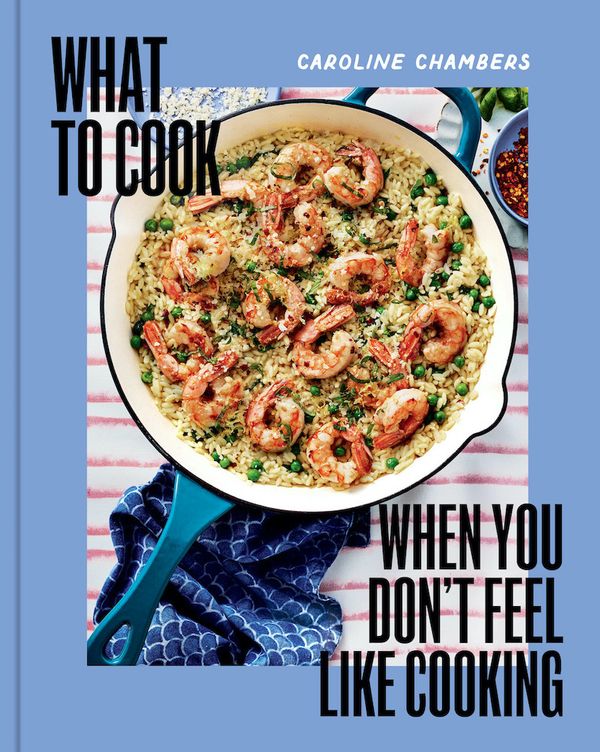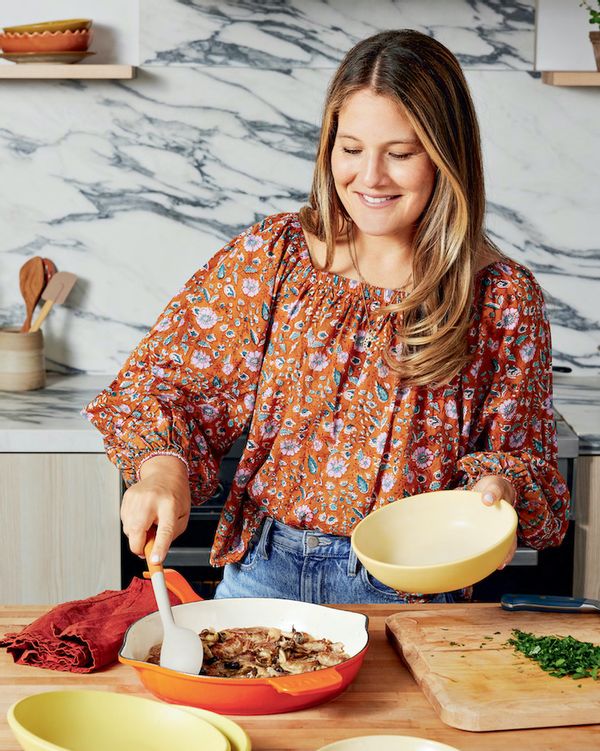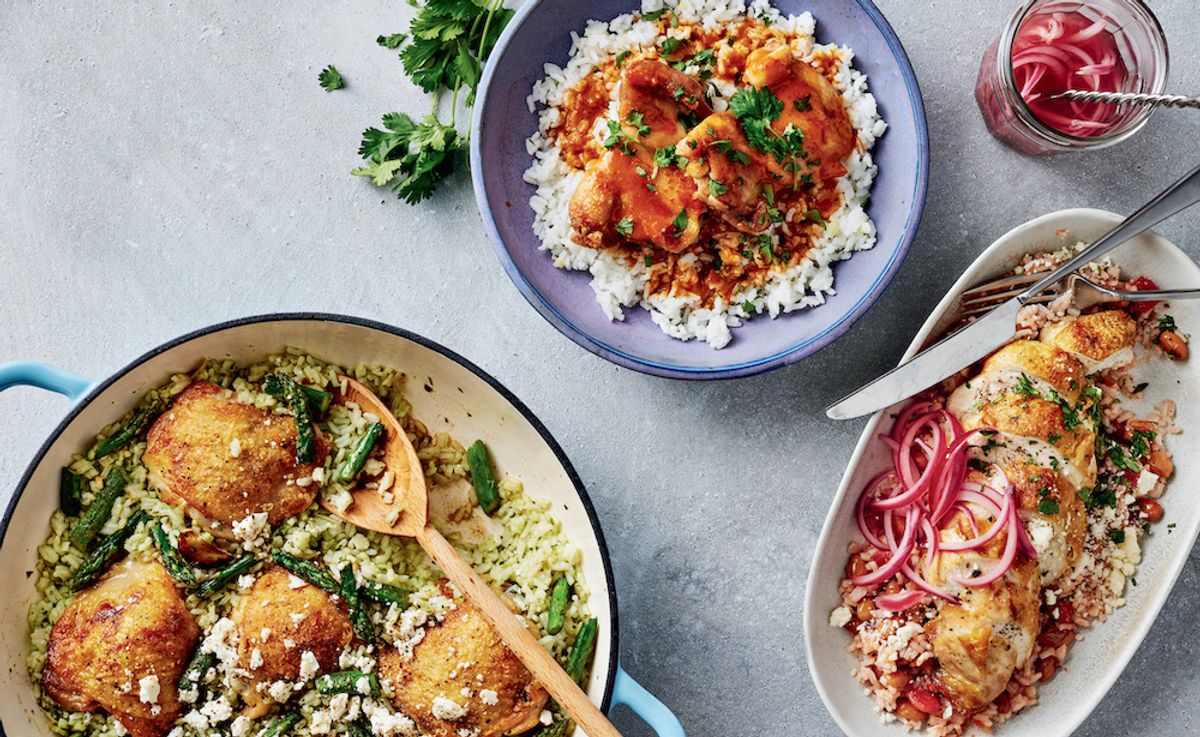Nearly six years after the launch of her very first cookbook, Caroline Chambers has a brand new release out on shelves nationwide.
Aptly named “What to Cook When You Don't Feel Like Cooking,” the recipe book is exactly what its name suggests, taking inspiration from Chambers’ hit Substack of the same name. It touts a slew of craveable, complete recipes — more than 100, to be specific — that make whipping up dinner all the less daunting. Craving chicken? Try your hand at making a delicious White Chicken Chili, Chambers suggests. Craving something hearty and filled with veggies? The Tomato Farrotto won’t disappoint.
“I think that our generation doesn't know how to cook for a number of reasons. Our mothers were the first ones who were working, like it was the first generation of women who were getting into the workplace. The microwave became a thing and processed food became a thing during our parents’ era of being parents,” Chambers told Salon Food amid her ongoing book tour.
“Our grandmothers were taught how to cook by their grandmothers because they had to help with the family. And then they taught our moms and then, it just didn't get passed down to many people. Thus, it can feel frustrating and scary to be in the kitchen.”
Chambers hopes her book will change people’s perspective on cooking for the better. Each chapter is organized by 15-, 30-, and 45-minute, or 1-hour, and “a little bit longer” recipes. There’s also no shortage of Chambers’ trusted tips and go-to shortcuts.
The following interview has been lightly edited for clarity and length.
Congratulations on your new cookbook release! Can you tell me a little bit about the book?
Sure! So, this book is called “What to Cook When You Don't Feel Like Cooking,” and it is exactly that. It is 100-plus recipes that are written and specifically designed for busy people who love good food. I am a professional recipe developer. I love food. I love cooking. Whenever people would tell me, ‘Oh, we never cook. We order takeout all the time,’ or ‘We don't love to cook,’ I was always like, ‘What is the deal?’ I couldn't relate. And then in 2019, I had my first son, Mattis, and suddenly, for the first time in my life, I never felt like cooking. I was exhausted trying to figure out how to balance being a working mom and a new mom and nourish my family. I never felt like cooking, and I realized that the types of recipes that I liked cooking take a lot longer and are a lot more fussy.
I was a freelance recipe developer at this time. I didn't have a community of any kind, but I started sharing on Instagram really “quickie” hacky recipes that got to the point and used standard ingredients, so people didn't have to go hunting all over the place. I started to grow quickly on Instagram by doing that. And then COVID happened, and I started growing even more quickly. I would give exact directions on how to use 10 different things, providing a swap for every single ingredient. Then in 2020, I launched this book — this concept — as a newsletter. I tried to launch it as a cookbook at that point but was rejected by every publisher. So instead, I turned to Substack and launched it as a paid newsletter and that's when it took off. I grew it for several years and then a publisher found it. Basically, it's just simple recipes that dirty as few dishes as possible, use as few ingredients as possible and take as little time as possible.
Do you have a favorite recipe (or two) from the book?
Oh yeah, definitely! I let my Substack community help me decide which 10 recipes from the Substack would be in the book. So the “Hella Green Pasta” in the book is a true crowd favorite from the newsletter. Our kids eat it. Picky husbands eat it. It's a ton of greens and garlic and parmesan. The sauce is like a sort of pesto made with kale and it's a bright green color. I also really love the “Panko Honey Mustard Chicken with Frico Broccoli” — it’s a sheet pan meal where you’re cooking this crispy, cheesy broccoli and this crunchy honey mustard chicken all on one sheet pan. I think this recipe really embodies what the book is about. It’s simple, but it has a ton of flavor. I love that recipe.
I’m curious to know more about your recipe development process. How do you go about creating new recipes, taking them from the kitchen onto pen and paper?
Writing a cookbook is a tricky process. I am the type of person who has to get all the recipes done first and then I'll do all the writing, which — for better or for worse — that's what I do. I spent about four months writing these recipes. We were in the middle of a renovation while I was doing it. We were moving from rental house to rental house, which I actually think benefited the book because I got to cook these recipes in non-ideal conditions. The whole book is written very much in colloquial language. A lot of cookbooks assume that the reader knows a lot about cooking and I do not do that here. So everything's written out. If I'm telling you to do a step, I'm explaining how to do it and why and helping you solve pain points.
 The cover of "What to Cook When You Don't Feel Like Cooking" (Union Square & Co. )Is your family involved in the process in any way? Do they help taste-test meals?
The cover of "What to Cook When You Don't Feel Like Cooking" (Union Square & Co. )Is your family involved in the process in any way? Do they help taste-test meals?
I have three young sons and they are the least helpful taste-test crew in the world. I said this last night but somebody was like, ‘What's a great kid-friendly recipe in the book?’ And I like to say no recipe is kid-friendly because kids aren't friendly. My son could be like, ‘I want that crunchy chicken you made that one time.’ And I'm like, ‘Great!’ And by the time I make it and serve it, he's like, ‘I hate crunchy chicken.’
My husband is involved in the process. My neighbors and friends are good taste testers and then, of course, I hire a professional food tester to test the entire book. Ali Slagle is a writer for The New York Times and a great recipe developer and she tested every single recipe in this book.
You mentioned that you’ve always loved food and cooking. When did you decide that you also wanted to write and publicize all the meals you were making?
I've been in the food space for a long time. I had a catering business in San Diego for several years and then when we moved up to northern California, I worked in a professional test kitchen, so developing recipes for restaurants like Quiznos, Panera and Starbucks. “What to Cook When You Don't Feel Like Cooking” is actually my second book — I wrote a book called “Just Married: A Cookbook for Newlyweds” back in 2017. I was already working in the food space and I tried to pitch my most recent book in 2019, but the publishing landscape had changed so much in just the four years since I got my last book deal in 2015. By this time, you needed to have your own community and followers to get a cookbook deal. Publishers no longer wanted to put their own money into a cookbook deal becoming popular. I was so busy with freelance recipe development that I just didn’t have the time to be writing free recipes for the internet so when COVID happened, that was really my moment to start working on growing my personal brand.
Take me back to the first time you met Anthony Bourdain at Union Square. How did that specific encounter influence your culinary journey?
It was a signing for “Kitchen Confidential,” Bourdain’s book about working in restaurants and the toxic culture there. That definitely helped me understand that cooking in a restaurant was not the life I wanted. I love food. I love experimenting with food. I knew that food was my passion, but I didn't know how to turn that into a career outside of the restaurant world. This is like 2011. Instagram is just getting big. Food blogging is already a thing. But I was like, that's not it. I don't want to be a food blogger.
That Bourdain encounter made me realize I want to work in food — I love it so much, but it’s not restaurants. From then on, I kept looking for my place. I tried catering. I tried a test kitchen. I tried freelance recipe development. All of those were like, all right, it's good, but what's next? This position of being a food creator is my exact sweet spot of where I want to be.
 Author Caroline Chambers (Eva Kolenko)I’m sure the list is pretty extensive, but which food creators and food writers do you look up to and draw inspiration from?
Author Caroline Chambers (Eva Kolenko)I’m sure the list is pretty extensive, but which food creators and food writers do you look up to and draw inspiration from?
Ina Garten is my biggest inspiration — I love everything she does. I love her attitude. I love her recipes. I love how diligent she is in testing her recipes. But what I find most inspirational about Ina is that she had a whole other life and a whole other career before she pursued food. She didn't start working in food until her 40s, and she didn't get her first show until later. That is the thing about her that I love the most and find most inspirational — especially as somebody who had a huge career shift myself when I was around 31 years old and after two babies. I look at other creators who are 22 and have Food Network shows, and I'm like, dang. It's easy to feel like I did something wrong. And then you realize, nope there's a time and a place for everything and if you keep hustling, it will come to you.
I love Justine Doiron. I love the way she melds cooking videos with storytelling. She'll be cooking seared cabbage, but she tells this incredible and fun story while she's doing it. What's gotta be cooking? Gaby Dalkin is a huge inspiration. She’s just the hardest-working person ever. I think a lot of food bloggers got left behind when the food media space started transitioning to Instagram and TikTok and she kept hustling. She's always changing her methods to continue to grow with her audience and she’s an amazing, supportive woman in the food space.
There’s a section in your newsletter that I really enjoy reading. It’s “So Into That,” which is different from your straightforward recipes and cooking posts. What was the inspiration behind that podcast and section? It’s so fun to read and incredibly personal.
“What to Cook” has been a strict food newsletter for about three years and I kept getting asked by my followers if I would ever start a podcast. I didn't want to start a food-based podcast. I wanted to be able to explore other topics. My Instagram followers and I get into a lot of awesome conversations that are outside of food. We talk about things like postpartum depression, how to keep marriage exciting and so much more on Instagram stories, but there was never a place for those stories to live in a bigger way.
I started a podcast called “So Into That” last fall and it’s a very chatty, fun, informal podcast where I have guests on and we talk about what they’re into right now and what I’m into right now. I met so many incredible people through it. It might come back in some form someday, but I was just spreading myself too thin and so I put the podcast on summer break. But I kept this idea of “So Into That” as a part of the newsletter because the podcast was being syndicated through Substack, so it was going out every Wednesday. I plan to have guests come help me but for right now, it's just the things that me and my team are really into right now. Today’s will be all about things that are helping me on my book tour, this handheld steamer I have, the lipstick I’ve been wearing…
”So Into That” gives my readers a glimpse inside my life and allows me to connect on a deeper level with my community than just like, here's a recipe.
What is your favorite memory related to food and cooking?
I'm a June 21 baby, and my mom is a wonderful but crazy home cook. For my birthday, it was always strawberry shortcake. Instead of doing a cute, little and neat strawberry shortcake, she would fill up an entire platter with store-bought shortcake all over the bottom, Cool Whip from a tub all over the top and strawberries just piled on top. It was this chaotic mess of things and she would stick candles all over it. What I love about it now, as a mother of three who, you know, birthdays sneak up and you're like, ‘Oh, crap, I forgot to order a cake!’ or like, ‘Oh, I forgot to order the perfect candles!’ None of it matters. When I look back at my strawberry shortcake birthday pics, it was pure chaos, like the ugliest birthday mess ever. But I just remember being like, ‘You know, my mom made this for me. It's huge, it's messy and it's fun.’ It helps me remember that none of it has to be that serious. You can have a lot of fun in motherhood and do crazy s**t like that and your kids are gonna have really happy, good memories from it.
What do you hope your readers will take away from the cookbook?
I hope that this book will give people the confidence that they need. There’s a salmon recipe in there that I think could be amazing for empowering novice cooks. Start with those 15-minute recipes and you’ll see that these recipes are written so easily in such colloquial terms. It’s like I’m standing there with you.
Read more
about food interviews:



Shares